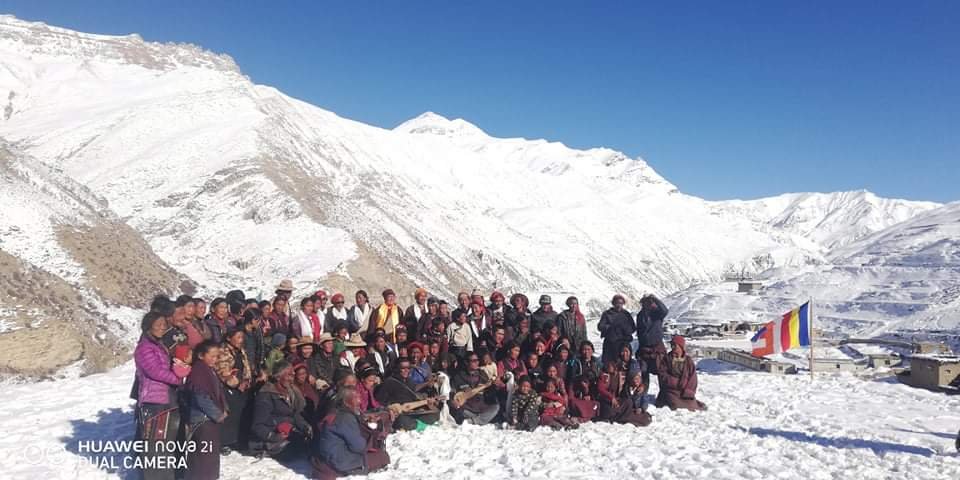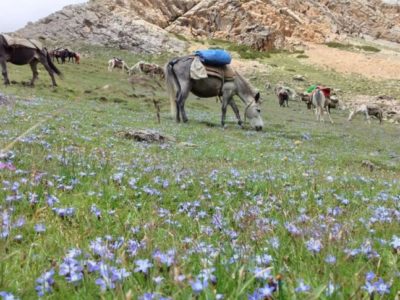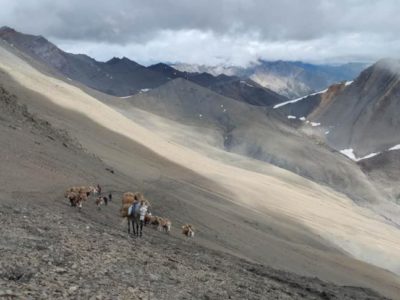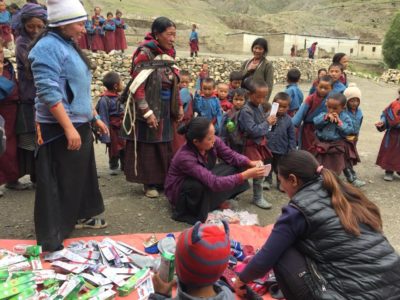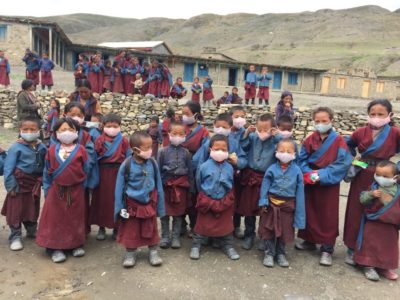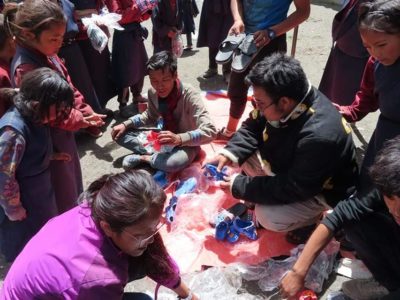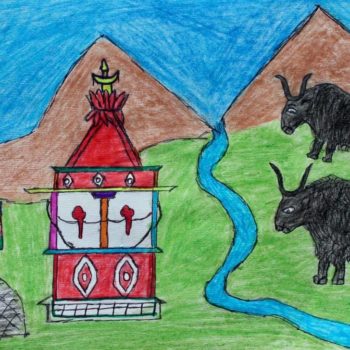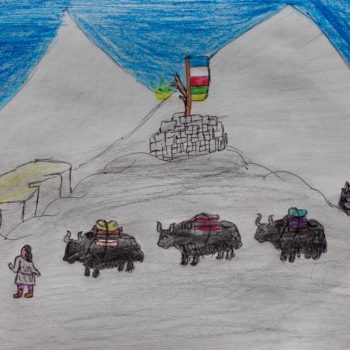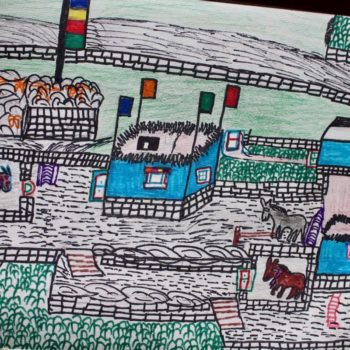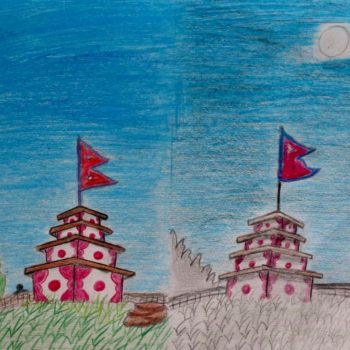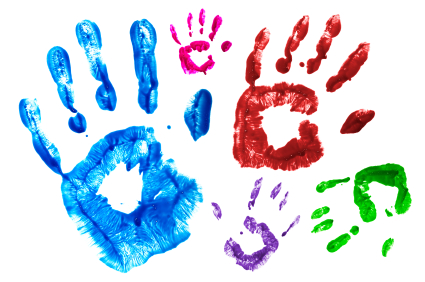
2020 Projects and Reports
There have been no reported cases of COVID-19 in the Upper Dolpo!
Hopefully quarantine protocols and ritual protections will continue to be effective and the region will be spared.
Elsewhere in Nepal numbers are trending ever upwards. On September 10 their COVID-19 tally had reached 53,120.
2020 has presented difficult challenges, not only for our schools but for the whole world, due to the Covid-19 Pandemic. Much of Nepal has been on lockdown for months and public schools have not be open. However, schools in the Upper Dolpo were given permission by the Shey-Phoksundo Rural Municipality to open as of June 18, which is 2.5 months later than normal, and our project teachers and coordinators were allowed to travel there after testing negative for the virus. After flying to Juphal, they traveled on foot (as usual) directly to their villages but had a difficult journey, as local villagers along the way were wary of any outsiders because of the virus so food and shelter were difficult to come by. After they reached their respective villages, they stayed in quarantine for 14 days before integrating into the village and opening the schools. As of September 2020, there have been no reported cases of Covid in the Upper Dolpo. No government teachers have been allowed to travel to the Upper Dolpo so the schools are being operated by our project teachers along with local volunteers. Although this situation is not ideal, it is better than losing an entire school year. We are grateful to the our project teachers and coordinators, and of course our kind and generous donors, for making this happen!
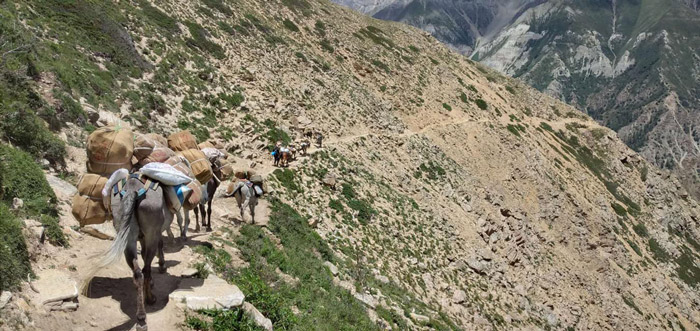
After a 3 month lockdown, teachers were cleared to return to the Upper Dolpo to open the schools for June 18. Each person was first tested for the virus. Sadly they had difficulty securing food during their week long walk from Juphal to the Upper Dolpo. People are very worried about any outsiders traveling through their villages. Once they reached their home village, they quarantined in the school for 14 days. Only project teachers returned to the schools, the government teachers could not (or would not?) return to the Dolpo.

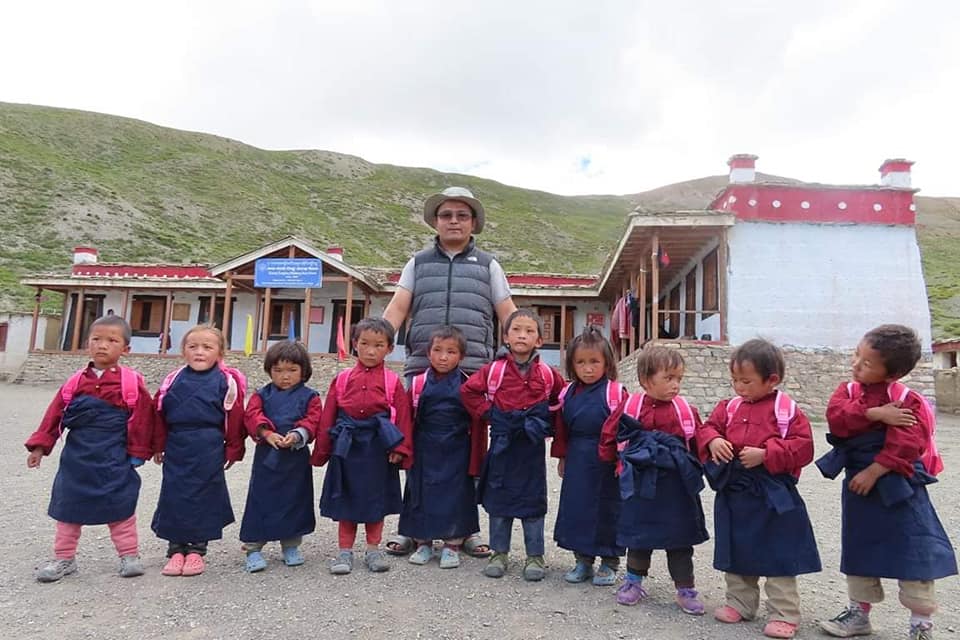
The school supplies did not reach the villages until mid-August! Extremely heavy monsoons created flooding and landslides, which delayed the shipments.
In addition to school supplies the following life changing products and materials provided by Altitude Project were also transported:
150 Solar Lights (by LuminAID)
200 Menstrual Hygiene Kits (by Days for Girls – Nepal)
Poly and other materials for up to 20 greenhouses
All thanks to kind and generous donors!
It is always a very long journey for the school supplies
2020 Projects in Brief
The Schools
Supporting education here is our primary focus
The remote Upper Dolpo region is politically and economically marginalized by the Nepali government. The government provides neither educational nor healthcare services. Until recently, access to education required moving to a monastery or to a boarding school in Kathmandu.
Your support enables the children of culturally Tibetan people to be educated in their home villages. The schools we support are managed locally and they teach the Tibetan language and culture in addition to the Nepali curriculum. Children can be raised in their own culture, local traditions and customs can be maintained, and village life can flourish. Your kind and generous support helps the people of the Dolpo keep their culture alive and thriving!
(For an academic overview we recommend Education, Tradition and Western NGOs in Dolpo – A Preliminary Report from the Fieldwork)
Karang School
We are the primary sponsor for this school now, which has an annual budget of ~ $35,000. We work in conjunction with the school coordinator, Pema Gojor, to determine the annual requirement.
We also provide support to the hostel in in Kathmandu for the students from Karang that wish to complete secondary education. Pema Wangchuk, the hostel manager does a terrific job, produces the annual report and reconciles the expenditures against the budgets.
The infrastructure at this school is in good condition and they have a very good greenhouse. The greenhouse was built with funding provided by Sumchog Kersbergen, Yak Girl Dorje Dolma’s sister.
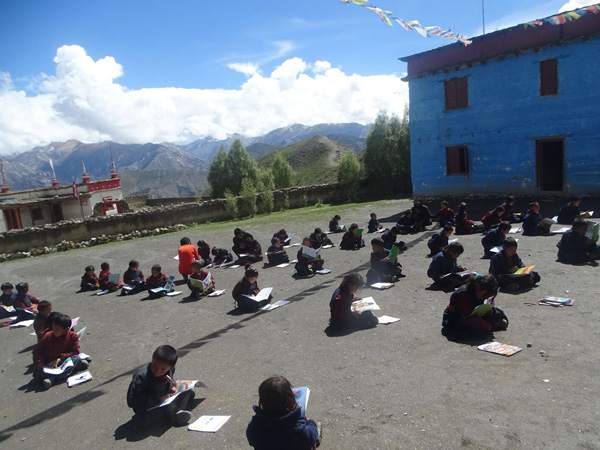
Saldang School
$8,000 for the school at Saldang, the school where Altitude Project started! We work in conjunction with a German non-profit, Freunde Nepal, to support this school. We take our instruction from Freunde Nepal regarding where support is needed. For example, in 2019 we were asked specifically to provide teacher salaries for some staff members.
We also covered some extras not in the regular budget such as toothbrushes, toothpaste, bar soap and a pair of warm socks. We also allocate some extra funding to the school coordinator as he generously helps us with other projects such as solar lights and greenhouses.
Leaking school roofs are still a problem and part of the budget must be allocated to repairs. Since they have started using heavy gauge plastic as part of the roof membrane, there are fewer problems but not all areas have been fixed yet.
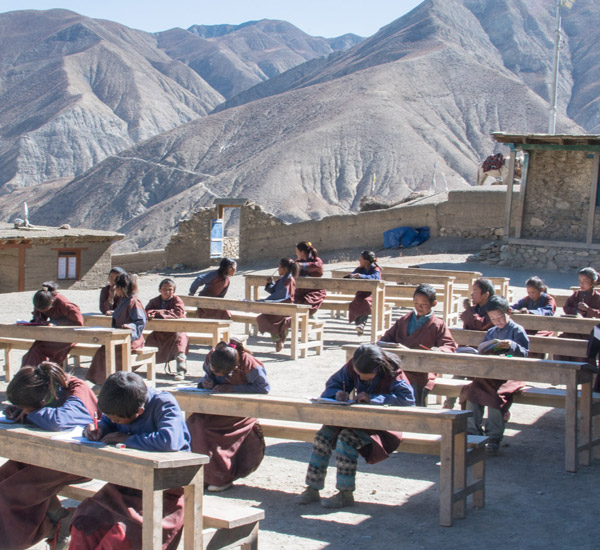
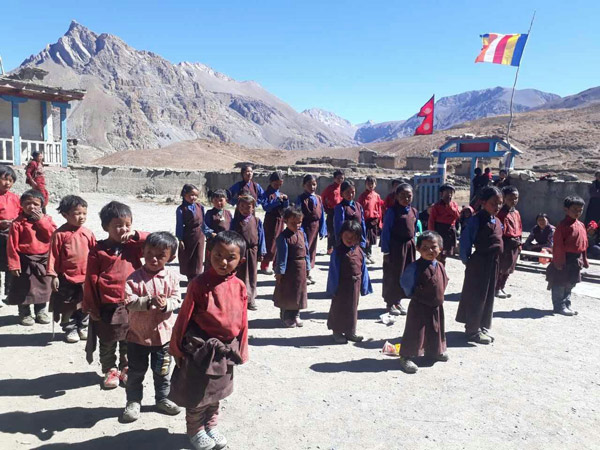
Komang School
$8,000 for the school at Komang (jointly funded with Sweden’s Tripod of Koma, and one generous German individual!). We manage the budget for this school.
For Komang in 2020 our support is directed towards teacher salaries, student supplies and uniforms, as well as food supplies for school lunches.
Purchased foods is primarily rice and lentils to make dal bhat. Locally supplied foods would be yogurt, buckwheat (pancakes), barley (tsampa), potatoes and any other vegetables that can be grown, many in a greenhouse (greens, carrots, cucumber, cauliflower, cabbage and squash).
Ku School
$2,000 for the school at Ku as another one-time grant. This extremely remote school was brought to our attention by Peter Werth, a philanthropist who works building sustainable energy and water projects throughout the Upper Dolpo. Freunde Nepal manages the budget with the school coordinator. Together, with a variety of NGOs, we cobbled together enough funds to keep this school going in 2019 and and 2020. The school coordinator, Pema Tsering Gurung, is a very ambitious, hard working young man and has created a website called The Rising Ku.
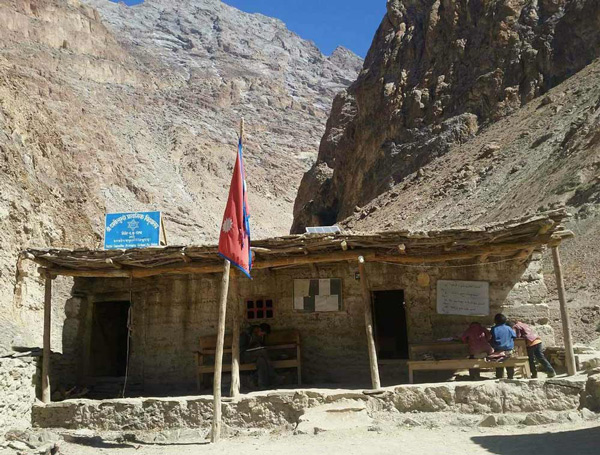
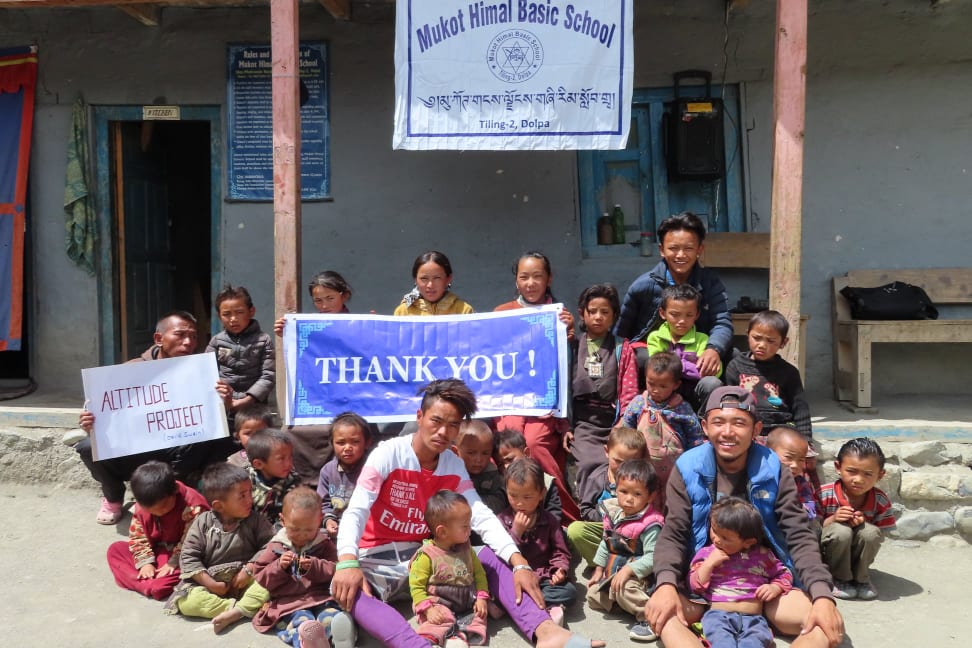
Tiling School
This school lost its sponsor in 2019 so funding was provided by a number of different NGOs. We provided $2,000 for cost to transport all supplies to the school for the year. We are planning to provide a similar level of support in 2020.
photo courtesy of David Powell
Greenhouses
Greenhouses – this is a new initiative for 2020. A shortage of arable land and a harsh climate makes food production here extremely challenging. Field crops are basic; barley, buckwheat and potatoes.
Greenhouses are becoming critical for food security as the Dolpo is increasingly impacted by climate change. Seasonal precipitation patterns have become erratic, some years there is not enough snow to provide melt water for the villagers water needs, last year there was too much snow and people and their livestock were killed by avalanches. In recent summers, unusually heavy rains have caused washouts of trails, small bridges and the terraces that are used to grow their staple crops.
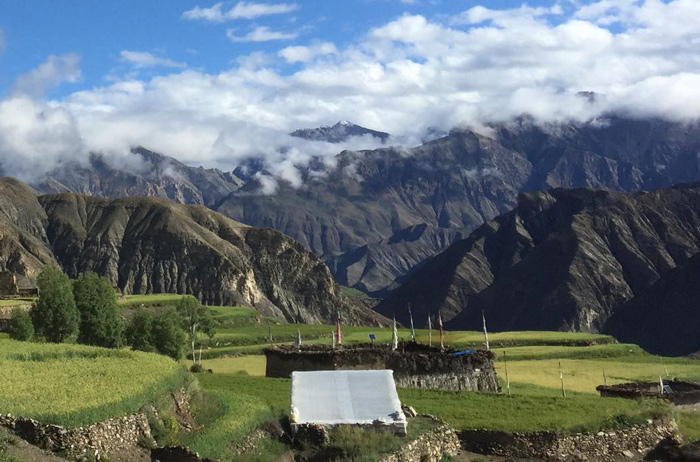
photo courtesy of Peter Hinze
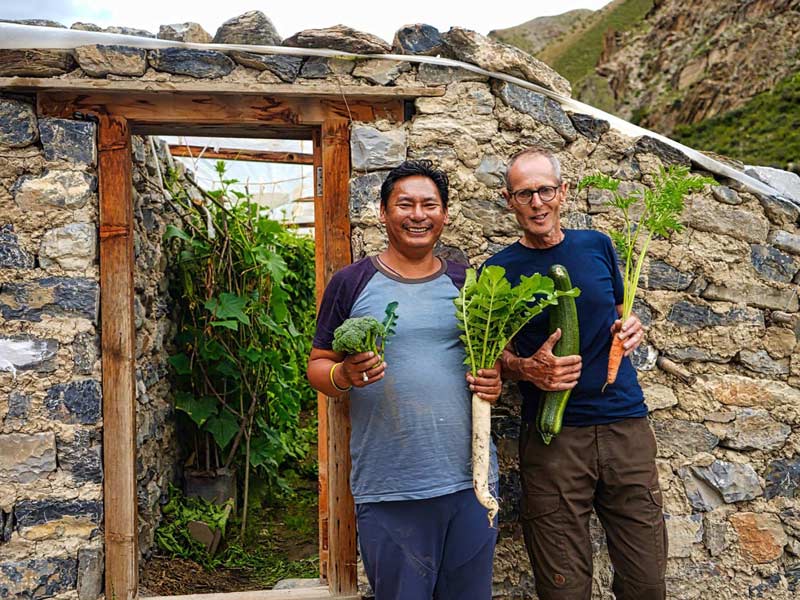
photo courtesy of Peter Hinze
Greenhouses lengthen the growing season significantly and provide nutritious vegetables that otherwise cannot be grown. The ability to grow greens, carrots, cucumber, cauliflower, cabbage and squash dramatically improves nutrition and food security.
Greenhouses also provide a warm, bright room in winter. They are used in the home for activities such as weaving, and in schools for winter classes on the Tibetan culture taught by local monks.
Generous donors provided dedicated funds that allowed us to purchase materials for 20 simple greenhouses that will be attached to homes.
The cost of materials is approximately $500 per greenhouse. Most materials are purchased in Kathmandu and include the seeds, the Silpaulin plastic film; 12 kg of iron cable; door handles, door and window hinges, screws and nails; buckets, watering cans and pipes for watering the vegetables. The wooden beams and pillars, the wooden timber and plywood for the access door and wall ventilator are available a few days from Namdo. The cables are woven under and above the plastic sheet to protect it from snow in winter and strong wind in autumn.
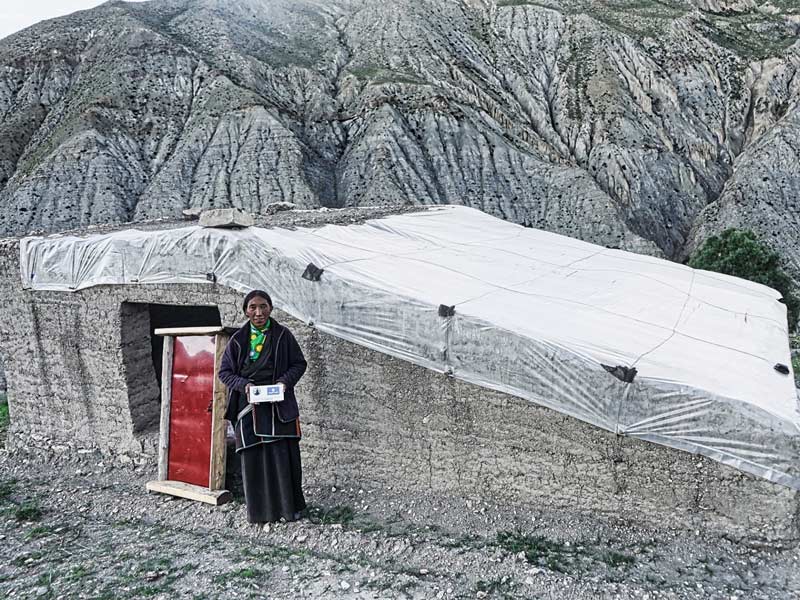
photo courtesy of Peter Hinze (we did not sponsor the building of this greenhouse)
photo courtesy of David Powell
Solar Lights
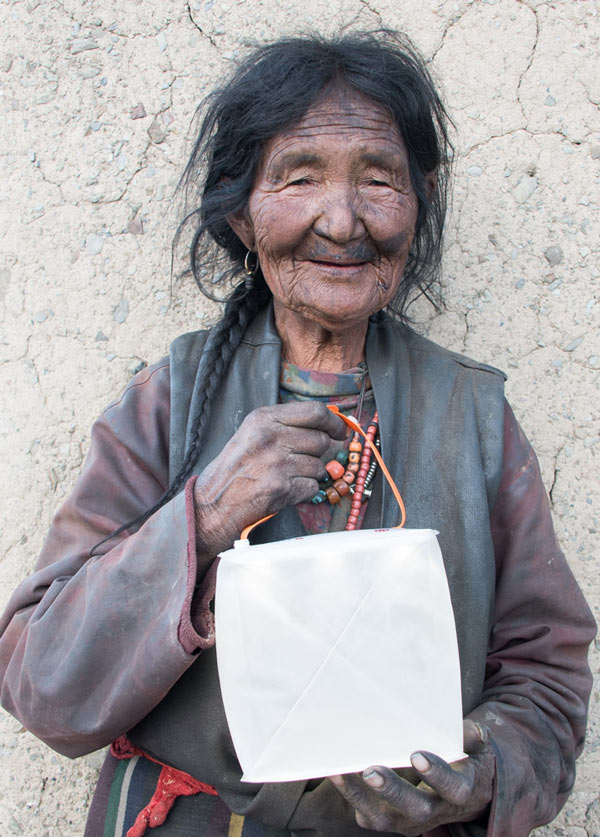
Purchase of solar lights for additional villagers
This year we sent 150 lights to the Upper Dolpo.
In October of 2017 when we trekked to the Upper Dolpo to visit the schools, we took 15 portable solar lights. The cost of each light is ~ $20 US. They provide ~ 150 lumens and can be hung like a lantern – a very practical design. We wanted to test their durability and usefulness so only took a few. Very quickly there was a request for 125 more lights, complete with names of individuals and their village location.
Fire from yak dung or kerosene lanterns is the only light source for most households here and the resulting indoor pollution causes pulmonary and eye disease. These lights have proven to be extremely useful and durable; as a general light in the home, to travel to the toilet at night; to help students read and study in the evenings, and to visit neighbours. Most unexpectedly, they seem to keep snow leopards away from their animals at night when they are grazing them in their high mountain summer camps.
Many of the older adults suffer from very poor eyesight due to exposure to long hours of sunlight working in the fields at 14,000 feet elevation. They say these lights have really improved their quality of life.
We are able to purchase these at considerable discount for charitable purposes through LuminAID and offer very special thanks for their help!
Menstrual Hygiene Kits
We delivered 200 Days for Girls menstrual hygiene kits – the number of kits needed was determined by nurses from the Dolpo. These kits are only $10 each but are life changing for the girls and women of the Dolpo.
Laila Bergman, a nurse with Nomad’s Clinic, posted –“When it comes to human dignity, we cannot make compromises- In our reproductive-health workshops, we dedicated our project to women empowerment by distributing reusable menstrual hygiene kits to all women in the remote region of Nepal. Women walk for days in the hopes of getting a kit for themselves or a young girl in their family. This small kit contribution makes a colossal difference to girls and women in rural Nepal, as it allows women to receive education by not missing school during their periods. Dignity for all!”
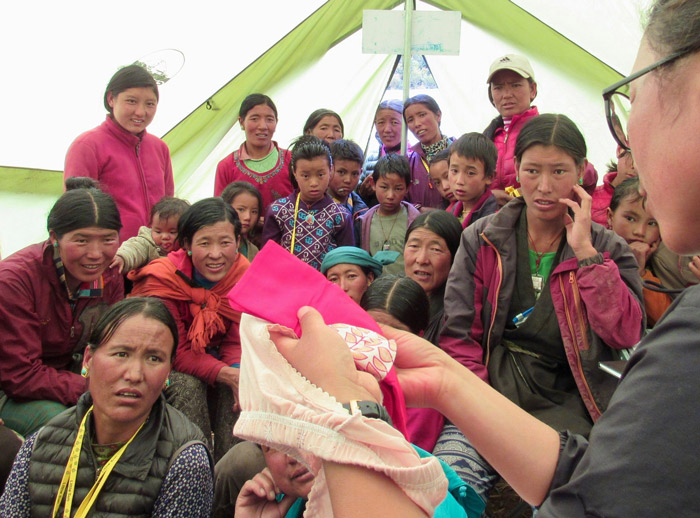
photo courtesy of Laila Bergman
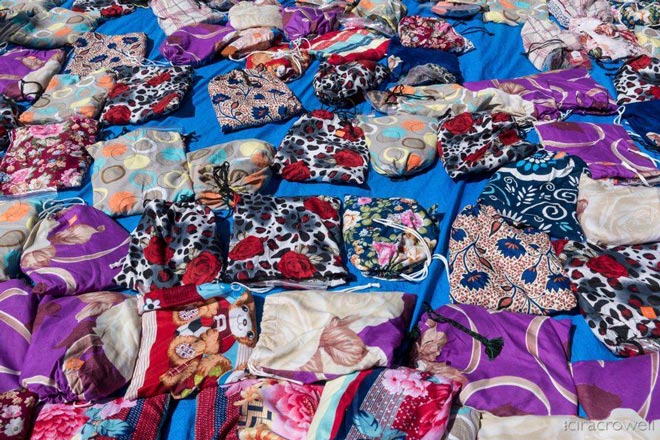
Each colorful kit contains underwear and 8 reusable menstrual pads, as well as soap, a snap in system and carrying bag. The kits are washable and can last up to five years. Nurses distribute them and give classes on fertility, biology and hygiene.
photo courtesy of Tsering Wangmo, Nurse and Co-Director of Nomads Clinic
Soap – A Small Helping Hand with a BIG Impact
Hand Washing!
Little did we know how important hand washing would be in 2020!
Many of you know that I caught pneumonia on my last trek and had to be helivacced out of the Dolpo to a hospital in Kathmandu.
Pneumonia is a common illness here and many die. Children, especially those weakened by undernourishment are most vulnerable. Improvement of general hygiene, especially hand washing with soap, dramatically reduces the incidence of this disease. (A study published in the Lancet showed that children younger than 5 years in households that received plain soap and handwashing promotion had a 50% lower incidence of pneumonia than controls.) This inspired us to supply soap for each student as part of the school supplies in 2020.
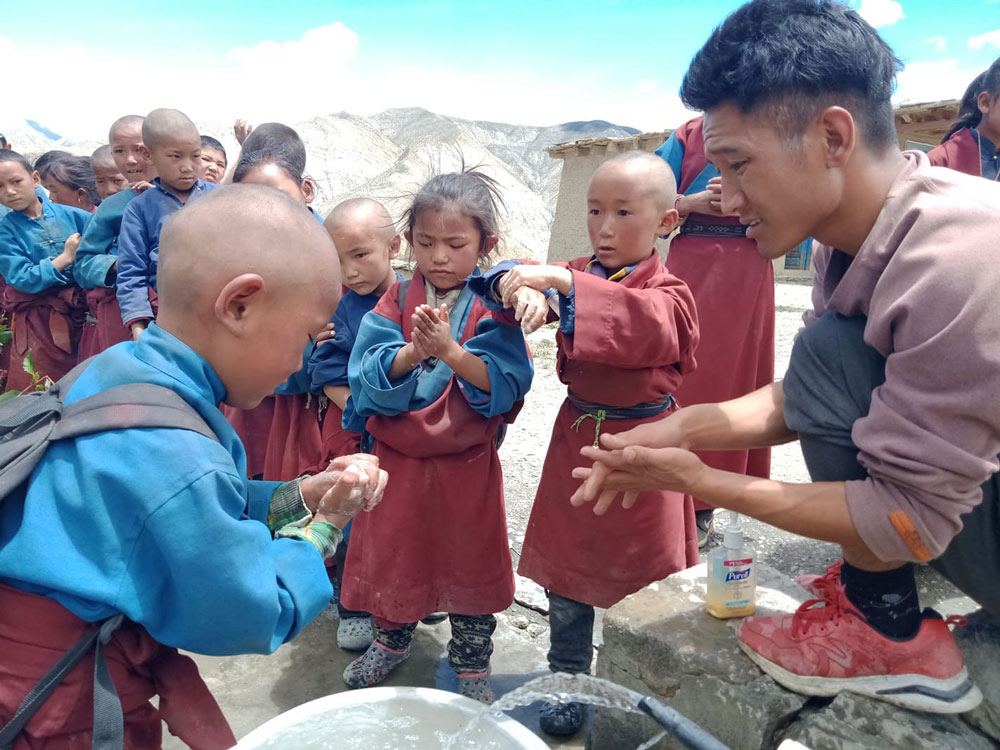
Teacher Training
REED
We continued with the second year of the three year REED teacher training program.
During 2018, the NGO REED – Rural Education and Environmental Development Centre Nepal, visited schools in the Upper Dolpo to assess the quality of education. Most project teachers are not professionally trained. They are people from the villages who completed high school, at minimum, in Kathmandu and have returned to help their villages as teachers.
REED proposed a three year teacher training program that would provide a path to certification for teachers that are not fully qualified. Nine NGOs contributed to this training effort and feedback from the 2019 training has been excellent.
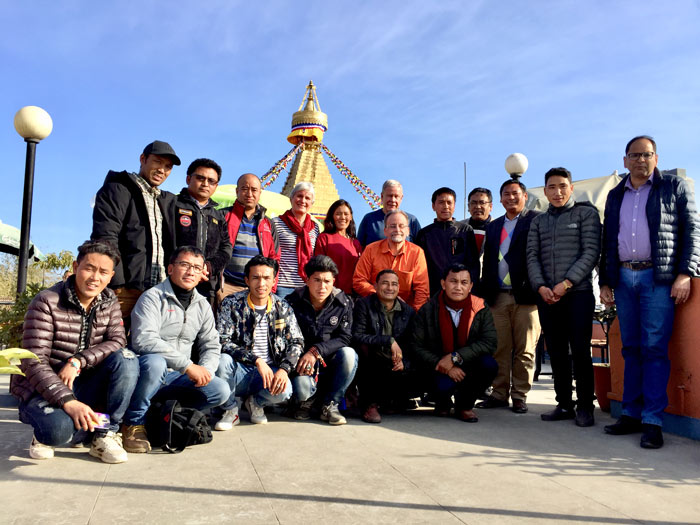
After our teacher training meeting with REED
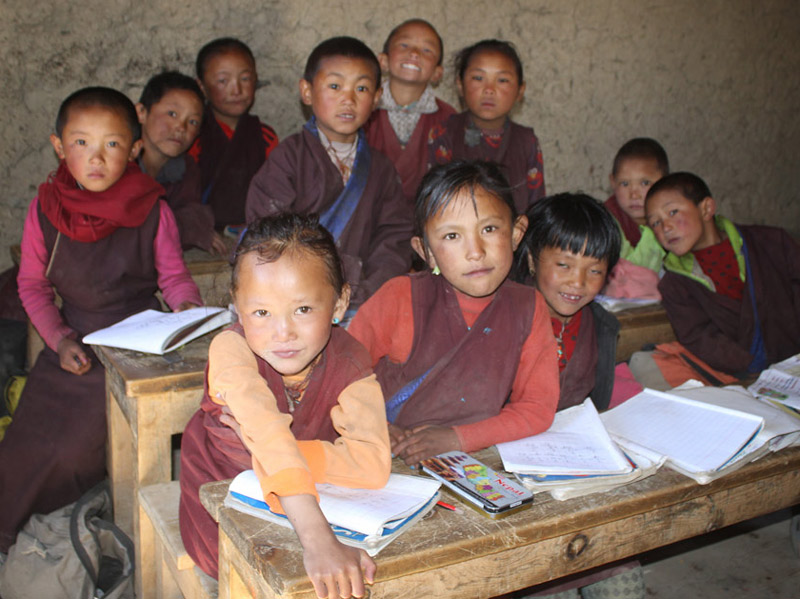
Teacher Training and Poverty
An interesting note…
The 2019 winners of the Nobel prize in Economics sought to explain empirically which interventions work to alleviate poverty and why. “The goal of our work is to make sure that the fight against poverty is based on scientific evidence.”
They illustrated that a true barrier to student achievement was teaching methods that were insufficiently shaped to student need, and that money spent on teacher training helped students learn more in school and yielded long lasting and invaluable results, not just for the individual students, but for lifting the community out of poverty.
Tenzin Norbu, Saldang Graduate
We continued our support of Tenzin Norbu. He entered class 10 at a Tibetan exile school in Kathmandu this year.
Saldang School only goes to class 6. The schools at Karang and Komas go to class 5. To continue their education, students must move to Kathmandu, the capital city of Nepal and a world away from the Dolpo. Please read more, these are truly amazing kids!
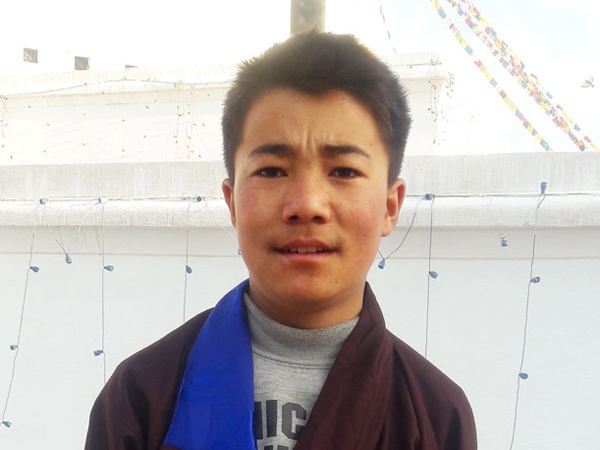
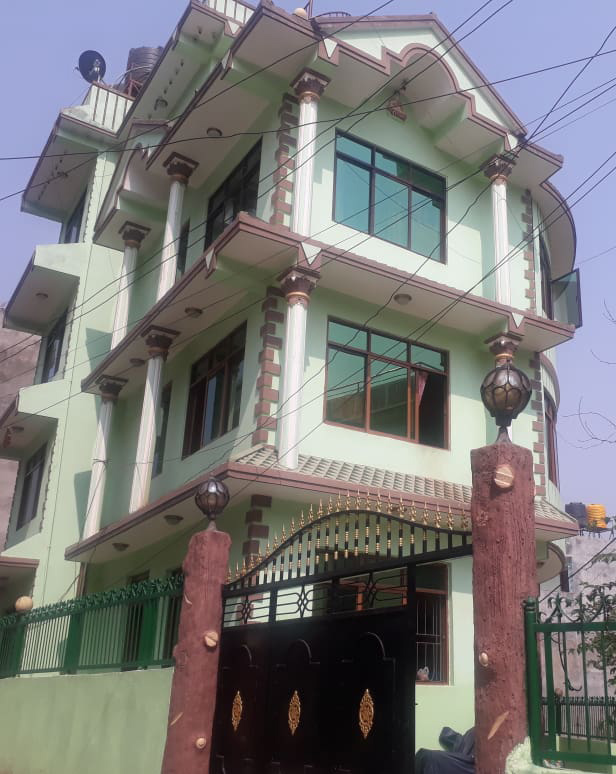
Karang Hostel in Kathmandu
Schools in the Upper Dolpo only teach to grade 5 or 6. Children wanting a secondary education must move to Kathmandu. Each village has a hostel in Kathmandu where the students live and study with other children from their village. They are supported by hostel staff, who are also from their village. This helps to maintain a sense of community and culture – a critical factor when they move from a village of 500 to the completely unfamiliar and chaotic environment of Kathmandu, population 1 million.
The village of Karang recently opened a hostel for its grade 5 graduates. The hostel requires support from the international community. The anticipated operating cost is $10,000 US. That includes rent, utilities, food, school fees and supplies and staff wages.
We want to say thank you again to the trekker who generously offered to support, on an ongoing basis, about 50% of the hostel budget! And, more great news, a group from France, AMTM – Assistance Médicale Toit du Monde (Medical Assistance Roof of the World), has agreed to sponsor 6 children at the hostel!
Our dream is to find more sponsors who want to help with this project on an ongoing basis. If this interests you, please email me. And if you ever travel to Nepal, the hostel would be a very easy place to visit to see the fruits of your kindness.
Drawings of Their Village Life
It always seems impossible, until it’s done.
– Nelson Mandela.

